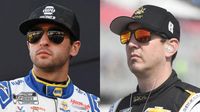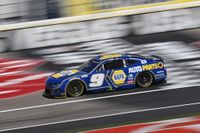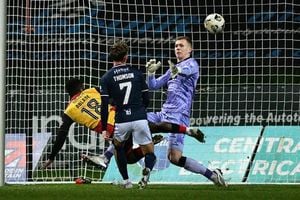The Las Vegas Motor Speedway has transformed itself from merely another racetrack to the epicenter of controversy this week as backlash against NASCAR's driver approval system intensifies. The situation escalated significantly after Daniel Suarez's catastrophic collision with Katherine Legge at Phoenix Raceway, which stirred frustrations within the NASCAR community.
During the race, with 98 laps remaining, Legge lost control on the second turn, resulting in her car colliding with Suarez’s Trackhouse Racing Chevrolet. This incident forced both drivers to grapple with the consequences of NASCAR’s approval procedures—especially considering it was Legge's inaugural run with Live Fast Motorsports. While both drivers opted for a brief public reconciliation, the NASCAR paddock's focus has turned distinctively toward the protocols governing driver eligibility.
Chase Elliott, who clinched the Cup Series championship in 2020, has joined the ranks of discontented drivers, expressing his concerns about the need for rigorous readiness checks for all competitors. Elliott declared, “Make sure everybody is geared up and ready,” emphasizing the importance of adequate preparation for drivers entering the Cup Series. He lamented, “This is the pinnacle of NASCAR… I think we need to make sure everyone is ready to go the same way I did when I ran ARCA races at Daytona.” His sentiments resonate with fellow NASCAR stalwarts—Kyle Busch, Denny Hamlin, Joey Logano, Kyle Larson, and even Suarez himself, all unified against perceived inadequacies within the regulatory standards.
Busch, boasting 62 Cup Series victories, didn’t hold back: “I’ve questioned the approval process for quite some time. There’s so much work to be done.” He suggested major improvements are necessary to optimize the system. Comparatively, Hamlin noted massive disparities between NASCAR and the structured processes seen within other racing circuits: “There’s no testing process when entering NASCAR. You just have to enter, right?” This lack of preparation was glaringly evident when Legge’s Phoenix debut came after just 45 minutes of practice—starkly contrasted to the month-long preparation afforded to rookies entering the Indianapolis 500.
The issue escalates when considering Suarez’s dedicated path through the ranks of NASCAR, from his early beginnings to his current status. He chastised NASCAR, stating, “If you’re thrown [into one of the most difficult series] it’s not fair.” His concern reflects on the contrasting structure of the Formula 1 Super License system, where drivers must collect points before being allowed to compete at elite levels.
Additional points of contention arose from Helio Castroneves' experience earlier this season. The four-time Indianapolis 500 champion faced hurdles during his Daytona 500 debut. Despite significant training and testing, he struggled to qualify and wound up finishing 39th after suffering early race misfortune—a frustration compounded by being granted entry through NASCAR's Open Provisional. Such inconsistencies illuminate the unpredictable nature of NASCAR’s approval processes.
The statistical evidence presents another layer of complexity: since 2010, only four out of 17 drivers migrating from open-wheel racing to NASCAR have scored victories, underscoring the challenges associated with this transition.
The Las Vegas Motor Speedway, poised for the upcoming race on March 23, finds itself grappling with the aftermath of these developments. The solidified stance taken by legendary drivers Elliott, Busch, Hamlin, Logano, Larson, and Suarez—collectively bearing 15 Cup Series titles—suggests the ramifications of this issue extend well beyond short-term disputes. Instead, it questions the very underpinnings of NASCAR's competitive integrity, safety protocols, and more.
Legge herself aired ambiguous sentiments about her debut, labeling it a “baptism of fire.” After the crash, she insisted on her qualifications and experience, clarifying, “There’s nothing wrong with her. What is wrong is NASCAR.” Though she possesses an expansive driving resume, including experiences across various racing platforms, her transition to NASCAR has sparked heated debates about the appropriate measures and experiences required for drivers aiming for elite levels.
The pulse of the NASCAR world is shifting; bitterness surrounding the approval system isn’t seen as isolated grumbling among drivers but rather as pivotal dialogue aimed at reshaping how regulations are currently structured. The contributions from heavyweights like Elliott and Busch ring clear: it’s imperative for NASCAR to revisit and possibly overhaul their approval standards to preserve the legitimacy and sanctity of competition.
This present moment signifies not just discontent, but potential for significant evolution within NASCAR. With the conversation now open and visible, it raises the question—what immediate actions will be taken, and will they align the governing body's standards with the perspectives of its drivers?





